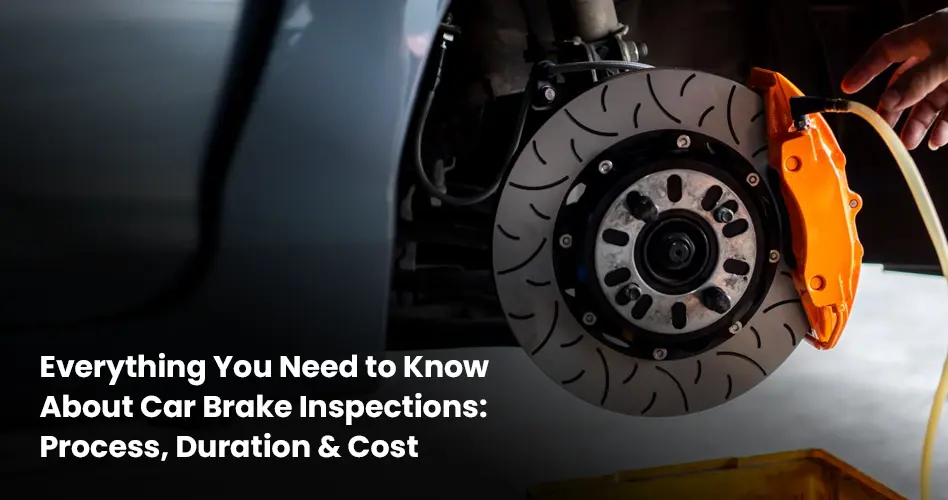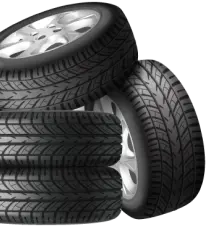This blog explains the inspection process, typical duration, and cost considerations, giving you clear insight into what goes into maintaining a safe, fully functional braking system. By understanding how brake inspections work, you can make informed decisions and keep your vehicle road-ready without unnecessary stress or guesswork.
Why Should We Perform a Brake Inspection?
Brakes are an important safety feature, ensuring full control of your vehicle and safeguarding you from potential accidents. Over time, components like brake pads, rotors, and callipers wear down due to friction and heat. Neglecting regular inspections can lead to reduced braking efficiency, increased stopping distance, and potential safety risks.
Performing a car brake inspection at least once or twice a year helps you:
-
Identify wear and tear before it turns into a major issue
-
Prevent sudden brake failure
-
Ensure even brake pad wear
-
Maintain overall vehicle safety and performance
An inspection is not just about avoiding expensive repairs; it’s about ensuring your vehicle remains safe to drive every day.
What Are The Signs You Need a Brake Inspection?
Even with regular servicing, your brakes can develop issues over time. Recognising early warning signs helps prevent serious failures. You should schedule a brake repair near you if you notice any of these:
-
Squealing, grinding, or squeaking noises when braking
-
A soft or spongy brake pedal
-
Vehicle pulling to one side when braking
-
Vibrations or pulsations in the brake pedal
-
Increased stopping distance
-
Dashboard brake warning light
Ignoring these signs can lead to unsafe driving conditions and more expensive repairs later.
What Happens During a Car Brake Inspection?
Many car owners wonder, “What happens at a brake inspection?” The process is more detailed than it might seem. An experienced mechanic examines various parts of your braking system to ensure everything functions properly.
Here’s what’s typically checked during a car brake inspection:
1. Brake Pads and Shoes
The mechanic checks the thickness and condition of the brake pads and shoes. If they’re too thin or unevenly worn, they’ll need replacement.
2. Brake Rotors and Drums
Rotors and drums are inspected for scoring, warping, or damage. Smooth surfaces help maintain even braking pressure and reduce vibration.
3. Brake Lines and Hoses
The mechanic checks for any leaks, cracks, or corrosion in the hydraulic lines that carry brake fluid from the master cylinder to the wheels.
4. Brake Fluid
The fluid’s level, colour, and moisture content are assessed. Contaminated or old fluid can reduce braking power and must be replaced.
5. Callipers and Wheel Cylinders
These parts apply pressure to the brake pads. Mechanics ensure they move freely without sticking or leaking.
6. Handbrake or Parking Brake
A full inspection includes checking the parking brake tension and performance to ensure it holds the car securely when engaged.
7. Test Drive and Performance Check
Finally, the mechanic may perform a short test drive to evaluate brake responsiveness, pedal feel, and noise levels.
This thorough process helps diagnose any issues before they become major safety concerns.
How Long Does a Brake Check Take?
One of the most common questions car owners ask is, “How long does a brake check take?” The answer depends on your vehicle’s make, model, and the condition of its braking system.
-
Standard Brake Inspection: Usually takes 30 minutes to 1 hour.
-
If Repairs Are Needed: If the mechanic finds worn pads or leaks, additional time may be required for replacement or servicing.
-
Comprehensive Brake Service: Including brake fluid change and rotor resurfacing, can take 1.5 to 2 hours.
A reliable automobile workshop near you will provide an accurate time estimate once they assess your car. It’s always best to book your appointment in advance, especially before long trips or scheduled roadworthy checks.
How Often Should You Get Your Brakes Inspected?
Brakes are complex systems that combine hydraulics, friction, and electronics to stop your car safely. Unlike simple wear-and-tear parts, brake issues often develop silently; a slight fluid leak, uneven pad wear, or rotor warping can reduce performance long before you notice it. That’s why a car brake inspection is essential to identify risks early, prevent unexpected breakdowns, and ensure consistent brake efficiency.
As a general rule, mechanics recommend a brake inspection every 10,000 to 15,000 kilometres, or at least once a year. However, factors like driving habits, terrain, and vehicle type can affect this interval.
For example:
-
City driving with frequent stop-and-go traffic causes faster brake wear.
-
Highway driving may extend the life of your pads, but you should still have them checked annually.
Consult your vehicle owner’s manual or visit a local workshop for guidance customised to your car’s needs.
Car Brake Inspection Cost
The car brake inspection cost can differ depending on several factors, rather than having a fixed rate. Every vehicle has a unique braking system, and the final cost depends on what’s required after the inspection.
Key factors that influence the overall cost include:
-
Vehicle type and model: Prestige or performance cars often have more advanced braking systems that may require additional checks.
-
Extent of wear or damage: If the inspection reveals worn pads, fluid leaks, or damaged rotors, extra labour and parts may be needed.
-
Type of service centre: Prices can vary between dealerships, independent workshops, and mobile mechanics.
-
Brake component quality: Choosing genuine or manufacturer-approved parts affects both price and longevity.
For an accurate estimate, it’s ideal to contact a trusted auto repair near you and request a detailed quote after a full inspection. This ensures transparency and helps you understand what your vehicle truly needs.
Choosing the Right Brake Inspection Service
Selecting the right workshop for your brake inspection is just as important as the inspection itself. Here’s what you should look for:
-
Experienced mechanics with experience handling your vehicle brand.
-
Transparent quotes with no hidden costs.
-
Use of quality parts that meet manufacturer specifications.
-
Accurate diagnostics using modern tools and testing equipment.
-
Convenient location for easy access and quick service.
If you’re searching online for car repair near you, ensure the workshop has positive reviews, mechanics, and a proven track record of reliability.
Why Choose BCS Workshop for Brake Inspections?
When it comes to keeping your brakes in effective condition, BCS Workshop stands out as a preferred name for professional and reliable service.
Here’s why many Melbourne car owners choose BCS Workshop:
-
Comprehensive Brake Inspections: Every brake component, from pads to callipers, is carefully checked for wear, leaks, and performance.
-
Experienced Technicians: Our team uses industry-standard diagnostic tools to deliver accurate assessments.
-
Quality Parts and Repairs: We use manufacturer-approved parts to ensure long-lasting safety and performance.
-
Transparent Pricing: You’ll receive upfront cost estimates with no hidden surprises.
Your safety is our priority, and we make sure your brakes work perfectly every time you hit the road. Our team provides reliable auto repair near you, ensuring your brakes are in optimal condition and your vehicle remains safe and road-ready at all times.
Takeaway
A car brake inspection is not just another maintenance task; it’s an essential safety check that protects you, your passengers, and others on the road. Understanding the process, cost, and timing helps you stay proactive and avoid unexpected issues.
If it’s been a while since your last brake check, now’s the time to schedule one. Book your next brake inspection with BCS Workshop to ensure your braking system performs safely and efficiently, no matter where your journey takes you.









